#Luís Figo
Explore tagged Tumblr posts
Text






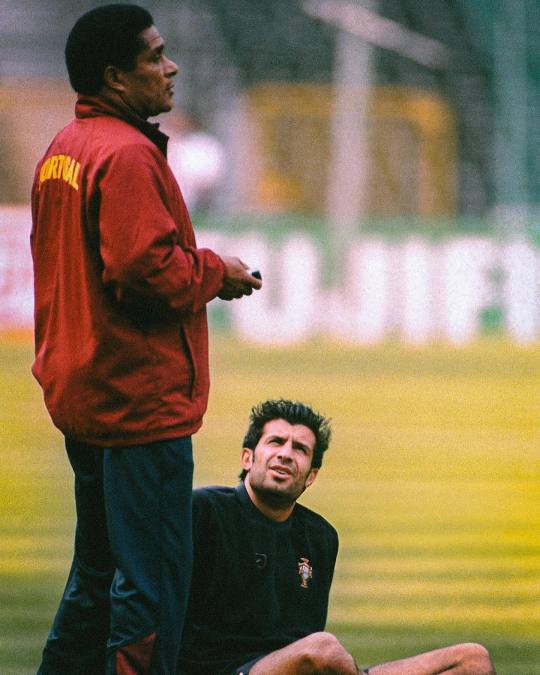
Luís Figo Euro 2000
3 notes
·
View notes
Text

Luis Figo, FC Barcelona 1999.
#football#fc barcelona#luís figo#luis figo#figo#sporting lisbon#fc barça#real madrid#inter milan#inter
8 notes
·
View notes
Text

Figo - Barcelona (ESP)
5 notes
·
View notes
Text
The Bunting Variations
Figos pingo-de-mel rainhas-cláudias
e uma cabaça de vinho tinto da venda
pão de centeio também e uma mão cheia
de azeitonas miúdas e alhos bravos
é tudo quanto posso pôr na mesa
se por aqui passares ó caminheiro
na lareira há caruma e pinhas secas
que as minhas noites são frias e frugais
ouço lá fora o vento em seu vai-vem
mas nenhum galho estala nos caminhos
que direcção tomaste tu ó caminheiro
ó dos membros pesados?
Luís Amorim de Sousa, A Luz Que Eu Buscava Intensa.
6 notes
·
View notes
Text






Michael Owen, David Beckham, Roberto Carlos, Raúl, Zinedine Zidane, Luís Figo & Ronaldo
#michael owen#david beckham#roberto carlos#raul gonzalez#zinedine zidane#luis figo#ronaldo#soccer#football#sports
4 notes
·
View notes
Text
Real Madrid Club de Fútbol

Real Madrid didirikan pada 6 Maret 1902 dengan nama Madrid Football Club oleh sekelompok mahasiswa dan pebisnis Spanyol yang terinspirasi oleh olahraga sepak bola yang berkembang di Inggris. Klub ini segera berkembang dan pada tahun 1905 memenangkan gelar pertamanya, Copa del Rey.
Pada tahun 1920, Raja Alfonso XIII memberikan gelar kehormatan "Real" (yang berarti "Kerajaan"), sehingga klub ini resmi berganti nama menjadi Real Madrid Club de Fútbol.
Ketika La Liga dibentuk pada 1929, Real Madrid menjadi salah satu pendirinya. Klub menunjukkan performa yang kuat dan meraih gelar liga pertamanya pada 1931-32 serta mempertahankannya pada musim berikutnya. Namun, Perang Saudara Spanyol (1936-1939) sempat menghambat perkembangan klub.
Pada era ini, Santiago Bernabéu, mantan pemain klub, mulai mengambil peran manajemen yang kelak membawa Real Madrid ke puncak dunia.
Setelah perang, Santiago Bernabéu menjadi presiden klub pada 1943 dan mulai membangun kembali Real Madrid. Salah satu langkah besarnya adalah pembangunan stadion baru, Santiago Bernabéu, yang diresmikan pada 1947.
Real Madrid mendominasi Piala Champions Eropa (sekarang Liga Champions UEFA) dengan 5 gelar berturut-turut (1956-1960), berkat kehadiran legenda seperti Alfredo Di Stéfano, Ferenc Puskás, dan Francisco Gento. Pada 1966, Madrid kembali meraih gelar Eropa dengan "Ye-Ye Team," tim yang berisi pemain Spanyol murni.
Setelah era Bernabéu, klub mengalami periode transisi. Pada 1980-an, muncul generasi La Quinta del Buitre yang dipimpin oleh Emilio Butragueño, meraih lima gelar La Liga beruntun (1986-1990). Namun, dominasi Eropa sempat menurun hingga akhirnya Liga Champions 1998 berhasil dimenangkan dengan kemenangan atas Juventus.
Era ini ditandai dengan kepemimpinan Florentino Pérez yang terpilih sebagai presiden pada tahun 2000, memperkenalkan proyek Los Galácticos, yang merekrut pemain bintang seperti Zinedine Zidane, Ronaldo Nazário, David Beckham, dan Luís Figo.
Real Madrid kembali ke puncak dunia dengan tiga gelar Liga Champions dalam lima tahun (2000, 2002, 2014). Puncak dominasi modern terjadi saat Zinedine Zidane menjadi pelatih (2016-2018), dengan Real Madrid memenangkan Liga Champions tiga kali berturut-turut (2016, 2017, 2018)—prestasi yang belum pernah terjadi sebelumnya dalam era modern.
Setelah kepergian Cristiano Ronaldo pada 2018, klub mengalami transisi, tetapi kembali mendominasi dengan memenangkan Liga Champions 2022.
Prestasi Real Madrid
La Liga: 35 kali juara
Liga Champions UEFA: 14 kali juara (rekor terbanyak)
Copa del Rey: 20 kali juara
Piala Super Spanyol: 12 kali juara
Piala Dunia Antarklub FIFA: 5 kali juara (rekor terbanyak)
TAG : bandar bola
0 notes
Text
Luís Filipe Madeira Caeiro Figo

Luís Filipe Madeira Caeiro Figo OIH ( pengucapan Portugis: [luˈiʃ ˈfiɣu] ; lahir 4 November 1972) adalah mantan pemain sepak bola profesional Portugal yang bermain sebagai pemain sayap untuk Sporting CP, Barcelona, Real Madrid dan Inter Milan. Dia mencatatkan 127 caps untuk tim nasional Portugal, sebuah rekor yang pernah ada, dan secara luas dianggap sebagai salah satu pemain terhebat di generasinya.
0 notes
Text
A Cultural and Historical Exploration of Jogos
The word "jogos" translates to "games" in Portuguese, encapsulating a diverse array of activities ranging from traditional board games to modern video games, and encompassing sports, educational games, and much more. Games have been an integral part of human culture for millennia, serving not only as entertainment but also as tools for learning, social interaction, and cultural expression. This essay delves into the historical significance, cultural impact, and the evolution of games, particularly focusing on the Portuguese-speaking world and the broader global context.
Historical Significance of Games
Games have a rich history that dates back to ancient civilizations. Archaeological findings suggest that board games like Senet in ancient Egypt (circa 3100 BC) and the Royal Game of Ur in Mesopotamia (circa 2600 BC) were prevalent. These games were often intertwined with religious and cultural practices. In the Portuguese context, traditional games such as "malha" and "chinquilho" have been played for centuries, reflecting social customs and communal bonds.
As societies evolved, so did the nature of games. In medieval Europe, games like chess and backgammon became popular among the nobility, while simpler games like dice were enjoyed by the common folk. The Age of Discovery, led by Portuguese explorers in the 15th and 16th centuries, facilitated the exchange of games and gaming ideas across continents, blending different cultural elements into new forms of entertainment.
Cultural Impact of Games
Games play a crucial role in cultural identity and community building. In Portugal and other Lusophone countries, traditional games are often tied to festivals and local celebrations. For instance, "jogos do pau" (stick fighting) is a traditional martial art that has roots in self-defense but also serves as a cultural heritage activity.
In contemporary times, football (soccer) is perhaps the most significant game in Portuguese culture. The sport is deeply embedded in the national identity, with clubs like Benfica, Porto, and Sporting Lisbon garnering massive followings. The success of Portuguese players like Eusébio, Luís Figo, and Cristiano Ronaldo has further cemented football's place in the cultural fabric.
Beyond traditional and sports games, modern video games have also made a substantial impact. Portuguese developers and companies have begun to make their mark in the global gaming industry, contributing to the growing cultural and economic significance of this medium.
Educational and Psychological Aspects of Games
Games are not merely for entertainment; they are also powerful educational tools. Educational games have been used to teach a variety of subjects, from mathematics to history, providing an interactive and engaging way for students to learn. In Portugal, educational games are increasingly being integrated into school curriculums to enhance learning outcomes.
From a psychological perspective, games can contribute to cognitive development and mental health. Puzzle games, for instance, enhance problem-solving skills and memory, while multiplayer games can improve social skills and teamwork. However, it's essential to balance gaming with other activities to avoid potential negative effects such as addiction or social isolation.
The Evolution of Games
The evolution of games has been rapid and transformative, particularly with the advent of digital technology. The transition from traditional board games to digital video games has expanded the possibilities for game design and player interaction. Early video games in the 1970s and 1980s, like Pong and Pac-Man, laid the foundation for a multi-billion dollar industry that continues to innovate.
In the Portuguese-speaking world, the development and consumption of video games have seen significant growth. Brazil, in particular, has emerged as a major player in the gaming market, both in terms of development and consumption. Portuguese game developers are increasingly producing games that reflect local culture and stories, thereby contributing to the global gaming narrative.
The Future of Games
Looking forward, the future of games is likely to be shaped by advancements in technology such as virtual reality (VR), augmented reality (AR), and artificial intelligence (AI). These technologies promise to create more immersive and interactive gaming experiences. For instance, VR can transport players into entirely new worlds, while AI can create more responsive and intelligent game characters.
Moreover, the social aspect of gaming is expected to grow with the rise of multiplayer online games and gaming communities. These platforms allow players from around the world to connect, collaborate, and compete, fostering a global gaming culture.
In the educational sector, games are expected to play an even more significant role. Gamification, the application of game-design elements in non-game contexts, is being used to motivate and engage students in their learning processes. This approach can make education more interactive and enjoyable, potentially leading to better educational outcomes.
Conclusion
Games, or "jogos," are much more than mere pastimes; they are a vital part of human culture and history. From ancient board games to modern video games, they have evolved to reflect societal changes and technological advancements. In the Portuguese-speaking world, games are a rich tapestry of tradition, culture, and modern innovation. As we look to the future, games are poised to continue their influential role in entertainment, education, and social interaction, bridging gaps between cultures and generations.
0 notes
Text
A marca Don Algodon está de volta

Don Algodon é uma marca de roupa Espanhola, fundada em 1980, mundialmente conhecida pelo seu estilo jovem. Inicialmente a sua gama de produtos era dedicada exclusivamente à roupa feminina, mas rapidamente diversificou a sua oferta entrando também no mercado dos perfumes. As suas fragrâncias, tal como a sua roupa, têm um estilo jovem e dinâmico e também neste ramo a marca é muito bem sucedida. A criação da sua primeira loja, numa rua de Madrid, que se multiplicou até perto da centena por toda a Espanha, provocou toda uma revolução na moda jovem, à época - uma adoração revista e quem sabe até ampliada nas lojas que também teve em Portugal. Conhecida na Península Ibérica nos anos 80 e 90, a marca de vestuário, acessórios e perfumes Don Algodon chegou a ter várias lojas em Portugal. Em Espanha atingiu, na altura de maior expansão, 80 unidades de retalho com o seu nome. Até 2005, sobreviveu graças à Cortefiel, que se manteve como sua acionista, mas já tinha sido completamente ultrapassada por outros pronto-a-vestir espanhóis, desde a já citada Zara até à própria Mango. A modelo Helen Svedin, mulher do futebolista português Luís Figo, há muitos anos radicada em Espanha, chegou a dar a cara pela Don Algodon, antes de a marca ser vendida aos americanos.

Uma referência no mundo da perfumaria que tem uma delicada linha de perfumes desenvolvida pela Myrurgia (hoje Puig). As fragrâncias Don Algodon transmitem momentos e experiências e que se apaixonam pelo bom gosto e aroma agradável. Don Algodón é sinónimo de naturalidade, harmonia e frescura. Actualmente a marca foi relançada por uma empresa têxtil valenciana, que aproveitando a qualidade e proximidade de uma boa marca, decidiu diversificar o negócio e criou novas linhas de produtos, como produtos têxteis para o lar e produtos domésticos para criança. Da mesma forma, as novas coleções de moda e acessórios estão prestes a chegar ao mercado.

Os purificadores de ar com haste Don Algodon são perfeitos para criar ambientes aconchegantes onde nos sentimos bem. O aroma é espalhado suavemente e uniformemente por todo lado onde o coloca. Don Algodon é um perfume que tem uma fragrância muito suave. É uma colónia bem conhecida e o seu aroma é inconfundível. É o complemento perfeito para a mulher dinâmica e alegre.

https://youtu.be/uIgWbS80kFY Uma nova era começa para Don Algodón, onde qualidade, tradição, confiança, calor e bom gosto atendem às últimas tendências. Estes são os mesmos valores que deram vida a uma marca lendária e empresa de roupas que está interessada em fazer parte de sua vida hoje. É por isso que Don Algodón está de volta com um espírito renovado, abraçando as tendências de hoje e apostando na moda, agora mais do que nunca. Read the full article
0 notes
Text
¿Cuál es el historial de enfrentamientos entre el Sporting de Lisboa y la Real Sociedad en competiciones europeas?
🎰🎲✨ ¡Obtén 500 euros y 200 giros gratis para jugar juegos de casino con solo un clic! ✨🎲🎰
¿Cuál es el historial de enfrentamientos entre el Sporting de Lisboa y la Real Sociedad en competiciones europeas?
Historial de enfrentamientos
En el mundo del entretenimiento para adultos, el "historial de enfrentamientos" es un término que se refiere a la historia pasada de interacciones físicas entre dos o más personas. En el contexto de películas para adultos, el historial de enfrentamientos puede describir las escenas pasadas en las que los actores han participado en encuentros íntimos.
El historial de enfrentamientos puede influir en la dinámica de una escena o de una película en general. Si los actores involucrados previamente han tenido una gran química en sus encuentros anteriores, es probable que esto se refleje en la pantalla y mejore la calidad de la actuación. Por otro lado, si ha habido conflictos o malentendidos en el pasado, esto también puede afectar la forma en que se desarrolla la escena.
Es importante tener en cuenta que el historial de enfrentamientos en el entretenimiento para adultos no necesariamente refleja la vida real de los actores. A menudo, las interacciones en pantalla son parte de un guion cuidadosamente elaborado y no deben interpretarse como una representación precisa de las relaciones personales entre los individuos involucrados.
En resumen, el historial de enfrentamientos es un concepto importante en el mundo del entretenimiento para adultos que puede afectar la forma en que se desarrollan las interacciones entre los actores en pantalla. Es fundamental entender que las escenas representadas son parte de un espectáculo y no siempre reflejan la realidad detrás de bastidores.
Sporting de Lisboa
El Sporting Clube de Portugal, comúnmente conocido como Sporting de Lisboa, es uno de los clubes de fútbol más antiguos y emblemáticos de Portugal. Fundado en 1906 en Lisboa, el Sporting ha sido históricamente uno de los tres grandes equipos de fútbol del país, junto con el Benfica y el Oporto.
El equipo juega sus partidos como local en el Estadio José Alvalade, que tiene capacidad para más de 50,000 espectadores. Los colores distintivos del Sporting son el verde y el blanco, y su lema es "Esforço, Dedicação, Devoção e Glória" (Esfuerzo, Dedicación, Devoción y Gloria).
A lo largo de su historia, el Sporting ha ganado numerosos títulos nacionales, incluyendo campeonatos de liga, copas nacionales y supercopas. Además, el club ha tenido éxito a nivel internacional, compitiendo en torneos europeos como la Liga de Campeones de la UEFA y la Liga Europa de la UEFA.
El Sporting de Lisboa ha sido cuna de grandes futbolistas portugueses, como Cristiano Ronaldo, Luís Figo y Rui Patrício, quienes han dejado una marca imborrable en la historia del club y del fútbol mundial.
En resumen, el Sporting de Lisboa es un club con una rica historia y una gran base de seguidores apasionados, que continúan apoyando al equipo en cada partido y celebrando sus éxitos en el campo de juego.
Real Sociedad
La Real Sociedad es un club de fútbol ubicado en la ciudad de San Sebastián, en el País Vasco, España. Fundado en 1909, es uno de los equipos más antiguos y emblemáticos de La Liga española. Conocido cariñosamente como "La Real", el equipo juega sus partidos como local en el estadio de Anoeta.
El color característico de la Real Sociedad es el azul y blanco, y su escudo muestra la corona real que hace referencia a su nombre. A lo largo de su historia, el club ha celebrado varios éxitos, incluida la conquista de dos títulos de La Liga y dos Copas del Rey.
La afición de la Real Sociedad es apasionada y comprometida con su equipo, llenando el estadio en cada partido para mostrar su apoyo incondicional. Los seguidores del club, conocidos como "realistas", han sido testigos de grandes momentos en la historia de la Real Sociedad, incluida la participación en competiciones europeas como la Liga de Campeones de la UEFA.
Además de su éxito en el campo, la Real Sociedad también se destaca por su cantera talentosa, que ha producido numerosos jugadores de renombre que han triunfado tanto en España como a nivel internacional.
En resumen, la Real Sociedad es un club con una rica historia, una base de seguidores apasionados y un legado de éxito en el fútbol español.
Competiciones europeas
Las competiciones europeas engloban algunos de los torneos deportivos más destacados a nivel continental, atrayendo la atención de millones de espectadores en todo el mundo. Entre las competiciones más reconocidas se encuentran la UEFA Champions League, la Europa League y la Supercopa de la UEFA.
La UEFA Champions League es el torneo de clubes más prestigioso de Europa, donde los mejores equipos compiten por el codiciado título. Con encuentros emocionantes y grandes figuras del fútbol, este torneo cautiva a los aficionados temporada tras temporada.
Por otro lado, la Europa League ofrece una oportunidad para equipos de distintas ligas europeas de demostrar su talento y competir a nivel internacional. Con partidos igualmente apasionantes, este torneo ha ganado popularidad en los últimos años y cuenta con una base de seguidores fieles.
Además, la Supercopa de la UEFA enfrenta al campeón de la Champions League con el ganador de la Europa League, en un duelo que garantiza emoción y rivalidad. Este evento anual es esperado por los aficionados como el cierre perfecto para una temporada llena de fútbol de alto nivel.
En resumen, las competiciones europeas son un verdadero espectáculo deportivo que reúne a los mejores equipos del continente, ofreciendo emoción, pasión y momentos inolvidables para los amantes del fútbol en todo el mundo.
Estadísticas de partidos
Las estadísticas de partidos son un aspecto fundamental en el mundo del deporte, ya que permiten analizar de manera objetiva el rendimiento de los equipos y jugadores. Estos datos recopilados durante un partido pueden ofrecer información valiosa para entrenadores, jugadores, aficionados y analistas.
Entre las estadísticas más comunes que se registran en un partido se encuentran la posesión de balón, los tiros a puerta, los pases completados, los desafíos ganados, las faltas cometidas y los goles anotados. Estos datos son cruciales para evaluar el desempeño de un equipo en diferentes aspectos del juego, como la creatividad en ataque, la solidez defensiva o la disciplina táctica.
Además, las estadísticas de partidos también pueden revelar patrones de juego, fortalezas y debilidades de un equipo, así como el impacto individual de cada jugador en el resultado final. Por ejemplo, un delantero con un alto porcentaje de tiros a puerta puede considerarse como un jugador clave en la ofensiva de su equipo.
En resumen, las estadísticas de partidos son una herramienta fundamental para comprender a fondo lo que sucede en el terreno de juego y ayudan a mejorar el rendimiento deportivo de los equipos y jugadores. Ya sea en el fútbol, baloncesto, tenis o cualquier otro deporte, el análisis de datos estadísticos es esencial para alcanzar el éxito.
0 notes
Text


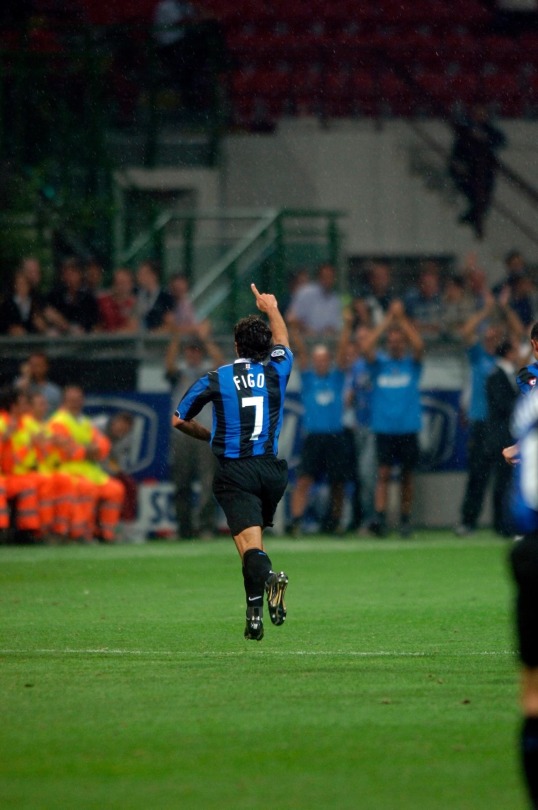
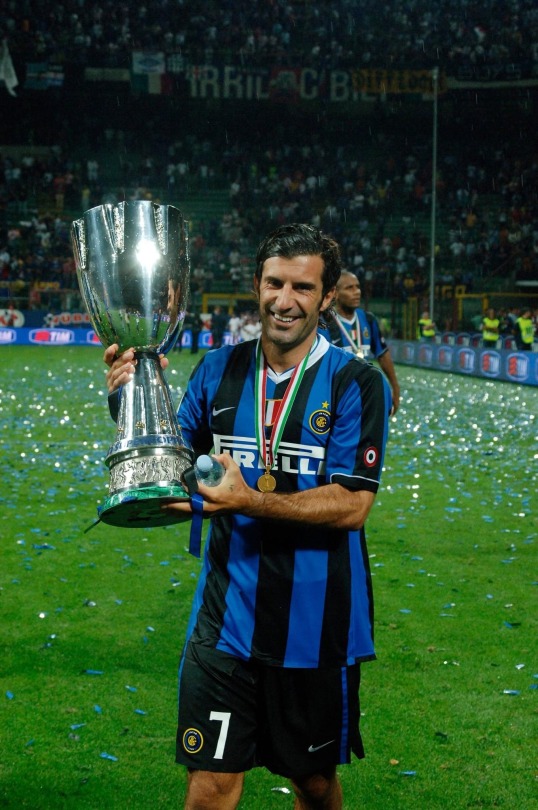
Luis Figo, Inter milan - Supercoppa italiana 2006 🏆💙🖤.
6 notes
·
View notes
Text

Digitain's taking ICE London by storm with Galácticos magic!
Here's your exclusive pass to meet football legends - Luís Figo and Michel Salgado at Stand S4-150, ExCeL London, on Feb 6 at 3:30 PM.
Don't miss out on this epic moment - swing by the Digitain Stand and be a part of history in the making!
#bet#betting#gambling#gaming#igaming#sportsbook#payment gateway#payments#ice london 2024#luis figo#figo#salgado
0 notes
Text
Complete List Of Clubs Luis Figo Played: Full Stats
All Clubs Luis Figo Played In: Luís Filipe Madeira Caeiro Figo is a former Portuguese professional footballer who played as a winger for the professional Portuguese team and is considered one of the greatest players of all time. Including many national, international, and club trophies, Figo is one of those legends who have several personal achievements as well. He started his career as a street…
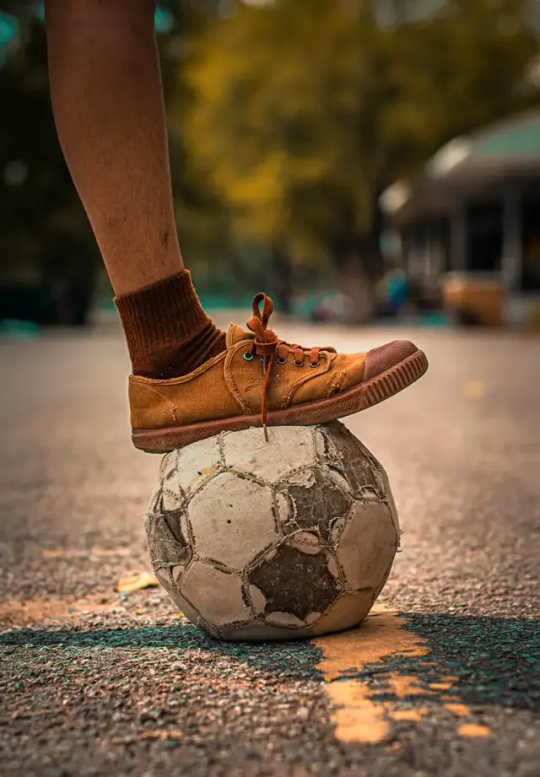
View On WordPress
0 notes
Text
Top 10 Greatest Portuguese Footballers of All Time
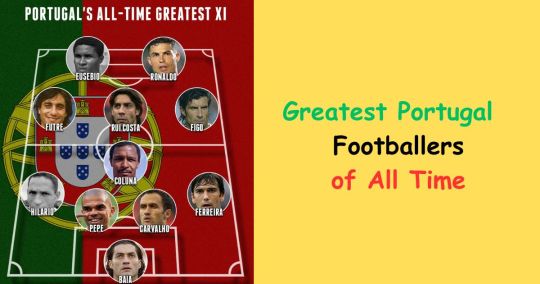
Cristiano Ronaldo:
Full Name: Cristiano Ronaldo dos Santos Aveiro
Date of Birth: February 5, 1985
Teams: Sporting CP, Real Madrid, Manchester United, Al Nassr
Position: Forward
Achievements: 5 Ballon d'Or awards, 4 European Golden Shoes, over 800 career goals, 32 trophies
Luis Figo:
Full Name: Luis Filipe Madeira Caeiro Figo
Date of Birth: November 4, 1972
Teams: Sporting CP, Barcelona, Real Madrid, Inter Milan
Position: Midfielder
Highlights: 1 Portuguese Cup, 4 La Liga titles, 3 Italian Super Cups, 4 Serie A titles
Eusebio:
Full Name: Eusébio da Silva Ferreira
Date of Birth: January 25, 1942
Died: January 5, 2014
Teams: Benfica
Position: Striker
Achievements: Top scorer at the 1966 FIFA World Cup, 733 goals in 745 matches
Mário Coluna:
Full Name: Mário Esteves Coluna
Date of Birth: August 6, 1935
Died: February 25, 2014
Teams: Benfica
Position: Midfielder
Achievements: 525 appearances, 127 goals for Benfica
Vitor Baia:
Full Name: Vítor Manuel Martins Baía
Date of Birth: October 15, 1969
Teams: Porto, Barcelona
Position: Goalkeeper
Achievements: 26 championships with Porto, played in two European Championships and 2002 FIFA World Cup
Paulo Futre:
Full Name: Paulo Jorge dos Santos Futre
Date of Birth: February 28, 1966
Teams: Sporting CP, Atletico Madrid, West Ham United
Position: Winger
Achievements: Spanish Cup winner, Portuguese Footballer of the Year in 1986 and 1987
Nani:
Full Name: Luís Carlos Almeida da Cunha
Date of Birth: November 17, 1986
Teams: Fenerbahce, Lazio, Valencia, Manchester United
Position: Winger
Achievements: UEFA Under-21 Championship, 112 appearances for the senior Portuguese team
Pepe:
Full Name: Kepler Laveran de Lima Ferreira
Date of Birth: February 26, 1983
Teams: Porto, Real Madrid
Position: Centre-back
Achievements: Two Primeira Liga titles, UEFA Champions League title, over 130 appearances for Portugal
Ricardo Carvalho:
Full Name: Ricardo Alberto Silveira de Carvalho
Date of Birth: May 18, 1978
Teams: Porto, Chelsea, Real Madrid, Monaco, Shanghai PSG
Position: Centre-back
Achievements: Instrumental in Porto's 2004 Champions League win, two Premier League titles with Chelsea
Deco:
Full Name: Anderson Luis de Souza
Date of Birth: August 27, 1977
Teams: Porto, Barcelona, Chelsea, Fluminense
Position: Midfielder
Achievements: UEFA Champions League winner with Porto, first player to win UEFA Midfielder of the Year award
#cristianoronaldo#luisfigo#eusebio#mariocoluna#vitorbaia#paulofutre#nani#pepe#ricardocarvalho#deco#footballer#football legends#soccer#goat#portugalfootball#footballlegends
0 notes
Text
Những điều cần biết về câu lạc bộ Real Madrid
Bên cạnh những câu lạc bộ nổi tiếng được nhắc đến thường xuyên như Bayern hay Liverpool. Thì trong số đó câu lạc bộ Real Madrid cũng là một cái tên nổi tiếng được nhiều người hâm mộ trên thế giới biết đến. Vậy hãy cùng France98 khám phá về đội bóng này qua bài viết này nhé.
Giới thiệu chung về CLB Real Madrid
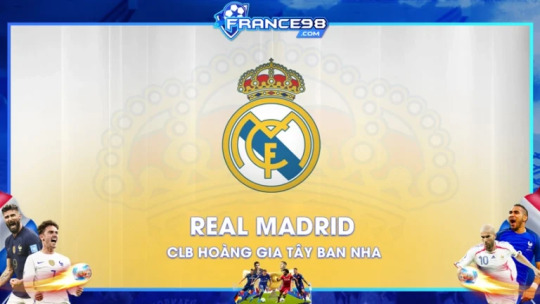
Real Madrid Club de Fútbol, thường được gọi là Real Madrid hoặc viết tắt là "Los Blancos", là một câu lạc bộ bóng đá hàng đầu tại Tây Ban Nha và toàn cầu. Đây là một trong những câu lạc bộ nổi tiếng và thành công nhất trong lịch sử bóng đá thế giới. Dưới đây là một số thông tin chung về CLB Real Madrid:
Lịch sử và Ngày thành lập: Real Madrid được thành lập vào ngày 6 tháng 3 năm 1902 bởi một nhóm các cầu thủ và người yêu thích bóng đá tại Madrid, Tây Ban Nha.
Sân nhà: Real Madrid thi đấu tại sân vận động Santiago Bernabéu, một trong những sân vận động nổi tiếng và hùng vĩ tại châu Âu. Sức chứa của sân là khoảng 81.000 chỗ ngồi.
Màu sắc và biểu tượng: Real Madrid mặc áo trắng kinh điển trong các trận đấu, và biểu tượng của câu lạc bộ là một ngôi sao ba cạnh màu trắng trên nền màu tím. Biểu tượng này thể hiện niềm tự hào và tinh thần của câu lạc bộ.
Thành tích và danh hiệu: Real Madrid là một trong những câu lạc bộ thành công nhất trong lịch sử bóng đá. Họ đã giành được nhiều danh hiệu quốc tế và trong nước, bao gồm 34 chức vô địch La Liga (Giải vô địch bóng đá Tây Ban Nha) và 13 chức vô địch UEFA Champions League, đạt được trong các năm khác nhau.
Các cầu thủ nổi tiếng: Real Madrid đã từng có nhiều cầu thủ tên tuổi và huyền thoại thi đấu trong đội hình của họ, bao gồm Alfredo Di Stéfano, Cristiano Ronaldo, Ferenc Puskás, Zinedine Zidane và nhiều ngôi sao khác.
Các giải thưởng cá nhân: Real Madrid đã tạo ra nhiều người giành giải Quả bóng vàng FIFA (FIFA Ballon d'Or) và Quả bóng vàng Châu Âu (European Golden Shoe) như Cristiano Ronaldo, Alfredo Di Stefano và nhiều cầu thủ khác.
Real Madrid không chỉ là một câu lạc bộ bóng đá, mà còn là một biểu tượng của sự đam mê và lịch sử trong làng thể thao thế giới.
Thành tích nổi bật CLB Real Madrid đạt được
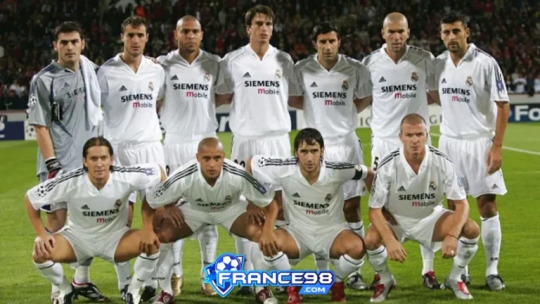
Real Madrid là một trong những câu lạc bộ bóng đá thành công nhất trong lịch sử, đã giành được nhiều danh hiệu và thành tích đáng chú ý trong cả nước và quốc tế. Dưới đây là một số thành tích nổi bật của CLB Real Madrid:
UEFA Champions League (Cúp C1 châu Âu):
13 lần đạt danh hiệu vô địch (1956, 1957, 1958, 1959, 1960, 1966, 1998, 2000, 2002, 2014, 2016, 2017, 2018).
La Liga (Giải vô địch bóng đá Tây Ban Nha):
34 lần đạt danh hiệu vô địch (1932, 1933, 1954, 1955, 1957, 1958, 1961, 1962, 1963, 1964, 1965, 1967, 1968, 1969, 1972, 1975, 1976, 1978, 1979, 1980, 1986, 1987, 1988, 1989, 1990, 1995, 1997, 2001, 2003, 2007, 2008, 2012, 2017, 2020).
Cúp Nhà vua Tây Ban Nha (Copa del Rey):
19 lần đạt danh hiệu vô địch (1905, 1906, 1907, 1908, 1917, 1934, 1936, 1946, 1947, 1962, 1970, 1974, 1975, 1980, 1982, 1989, 1993, 2011, 2014).
Siêu Cúp Tây Ban Nha (Supercopa de España):
11 lần đạt danh hiệu vô địch (1988, 1989, 1990, 1993, 1997, 2001, 2003, 2008, 2012, 2017, 2019).
Cúp Câu lạc bộ bóng đá Thế giới FIFA (FIFA Club World Cup):
4 lần đạt danh hiệu vô địch (1960, 1998, 2002, 2014).
Cúp UEFA (Europa League):
2 lần đạt danh hiệu vô địch (1985, 1986).
Cúp C2 châu Âu (Cúp Các nhà vô địch cúp quốc gia châu Âu):
2 lần đạt danh hiệu vô địch (1985, 1986).
Cúp bóng đá châu Âu/Liên đoàn các câu lạc bộ châu Âu (UEFA Cup Winners' Cup):
2 lần đạt danh hiệu vô địch (1962, 1983).
Real Madrid cũng nổi tiếng với việc có nhiều cầu thủ giành giải Quả bóng vàng FIFA (FIFA Ballon d'Or), bao gồm Cristiano Ronaldo, Alfredo Di Stéfano, Raymond Kopa, Luís Figo, Ronaldo, Zinedine Zidane và nhiều người khác.
Kết luận
Trên đây là những thông tin ngắn gọn về câu lạc bộ Real Madrid được chúng tôi chọn lọc gửi đến cho bạn đọc. Hy vọng rằng bài viết này sẽ có ích cho bạn khi đang muốn tìm hiểu về CLB chuyên nghiệp này.
Xem thêm: https://france98.com/cau-lac-bo-bong-da-real-madrid/
0 notes